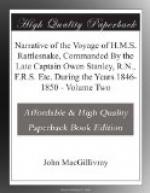We killed the horse this morning as he was not able to stand, and dried the meat to carry with us; we made a small stage of saplings on which to dry the meat, which was cut off close to the bone as clean as possible, and then cut in thin slices, and laid on the stage in the sun to dry, and the sun being very hot, it dried well; the heart, liver, and kidneys were parboiled, and cut up fine, and mixed with the blood of the horse and about three pounds of flour; they made four puddings, with which, after they had boiled about four hours, we satisfied our appetites better than we had been able to do for some time: it was served up in the same manner as our usual rations, in equal parts, and each man had a right to reserve a portion of his mess till the next day, but very little was saved. Mr. Kennedy found that it was even necessary to have the horseflesh watched whilst drying, finding that two or three of the party had secreted small quantities amongst their clothes; such precautions were quite necessary, as well in justice to the whole of the party, as to keep up the strength of all, which seemed to be very fast declining. At night we made a fire to smoke the meat, and to destroy the maggots, which were very numerous in it; we packed the meat in empty flour bags.
October 4.
We proceeded northward over small sandy plains, covered with annual grass, which was now very much withered, and through belts of dwarf bushy Melaleucas and Banksias. We were not far from Princess Charlotte’s Bay, Jane’s Table Land being in sight. We came to the side of a salt lagoon, very nearly dry; we found it covered with salt, of which we took about 20 pounds, which was as much as we could carry, but even this was a very seasonable help; we rubbed about two pounds of it into our meat. We encamped by a small creek, but the water was brackish, and not being able to find any other we were obliged to make use of it. One of our horses was slightly hurt by a stump of a mangrove tree. All we got from the horse we last killed was sixty-five pounds of meat.
October 5 and 6.
We travelled over sandy soil, but with little grass, meeting frequently with salt lagoons, surrounded by various salsolaceous plants. Near the edge of a saltwater creek we found a native camp, composed of about seven or eight huts, curiously and neatly built of a conical form; all very nearly of the same size, about five and a half feet in diameter at the base, and six and a half feet high. They were made by placing saplings in the ground in a slanting position, which were tied together at the top and woven inside like wickerwork, with strips of small bamboo canes. The whole was then covered with palm leaves, over which was a coating of tea-tree bark, very neatly fastened by strips of cane. They were substantially built, and would no doubt keep out the wet effectually. They seemed to be occupied by the natives only in the rainy season, as, from their appearance, they had not been inhabited




